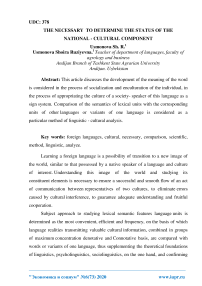The necessary to determine the status of the national - cultural component
Автор: Usmonova Sh.R.
Журнал: Экономика и социум @ekonomika-socium
Рубрика: Основной раздел
Статья в выпуске: 6-1 (73), 2020 года.
Бесплатный доступ
This article discusses the development of the meaning of the word is considered in the process of socialization and enculturation of the individual, in the process of appropriating the culture of a society- speaker of this language as a sign system. Comparison of the semantics of lexical units with the corresponding units of other languages or variants of one language is considered as a particular method of linguistic - cultural analysis.
Foreign languages, cultural, necessary, comparison, scientific, method, linguistic, analyze
Короткий адрес: https://sciup.org/140252435
IDR: 140252435 | УДК: 378
Текст научной статьи The necessary to determine the status of the national - cultural component
Learning a foreign language is a possibility of transition to a new image of the world, similar to that possessed by a native speaker of a language and culture of interest. Understanding this image of the world and studying its constituent elements is necessary to ensure a successful and smooth flow of an act of communication between representatives of two cultures, to eliminate errors caused by cultural interference, to guarantee adequate understanding and fruitful cooperation.
Subject approach to studying lexical semantic features language units is determined as the most convenient, efficient and frequency, on the basis of which language realities transmitting valuable cultural information, combined in groups of maximum concentration denotative and Connotative basis, are compared with words or variants of one language, thus supplementing the theoretical foundations of linguistics, psycholinguistics, sociolinguistics, on the one hand, and confirming the practical significance of 9 for lexicography, translation studies, teaching methods of foreign language, communication practices, etc.
The term national cultural component is understood to mean the micro component of the word meaning, embodying the national specific features of the material and spiritual culture of a particular linguistic and cultural community. Regarding the status of this component, an analysis of the scientific literature devoted to this problem allows us to conclude that there is no clearly defined status for the national ion-cultural component in the semantics of lexical units. The generalized “ethnicity”, “locality”, and many others are distinguished, depending on the thematic group of a certain vocabulary, present separately or jointly in certain combinations in this semantic component.
To determine the status of the national - cultural component, it is necessary to turn to the consideration of the content structure of the word.
Linguists of all schools and directions agree that the word contains at least two types of information: in addition to the lexical concept (an indication of a designated subject, process, phenomenon or sign), it may include other components: emotional and stylistic coloring, correlation with other words of the same language.
Many scholars consider the expressive use of a linguistic unit to be ethnically specific and the connotative component of semantics is nationally determined, since in their opinion, the concept of connotation includes, first of all, those additional meanings that are cultural-historical , which reflect the national specificity of linguistic means (suffixes, introducing subjective words into semantics assessment, for example, diminutive suffixes).
The most interesting is considered lexical units with the national-cultural component in the denotations in the aspect of the dynamics of the national-cultural component of the semantics. As there is no doubt that over time, the semantic structure of verbal units is subject to time personal changes: the emergence of new, rearrangement of existing value components. The question arises, what happens with the national-cultural component with this kind of change.
The construction of a structural composition of cultural significance gives a real opportunity to reassess some theoretical definitions and postulates of linguoculturology, in particular, the semantics of linguistic units (in terms of the cultural component in the form of a semantic share) and their relations with cultural significance. The latter has an independent ontological status and characterizes the national culture of its people. There are many ways of expressing it, but one of the most effective is language as the primary modeling sign system.
"Экономика и социум" №6(73) 2020
Список литературы The necessary to determine the status of the national - cultural component
- Vezhbitskaya A.A. Tongue. The culture. Cognition. - M.: Russian dictionaries, 1997.-- 416 p.
- Kabakchi V.V. The practice of the English language of intercultural communication / V.V. Kabakchi - SPb. 2001.
- Oshchepkova V.V. Language and culture of Great Britain, USA, Canada, Australia, New Zealand. - M. / St. Petersburg.: GLOSS / KARO, 2004.


